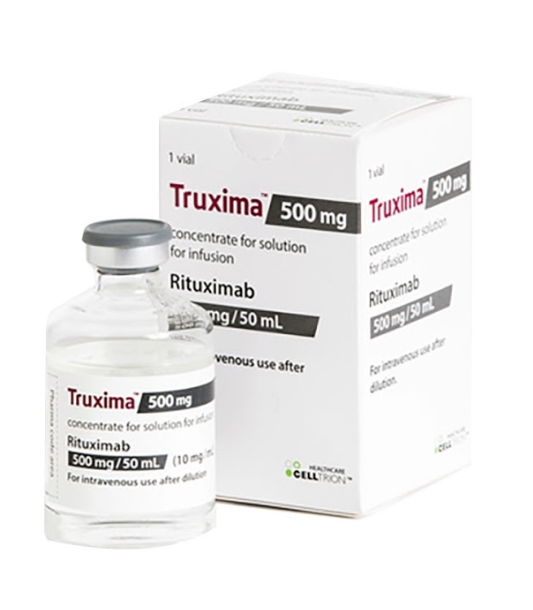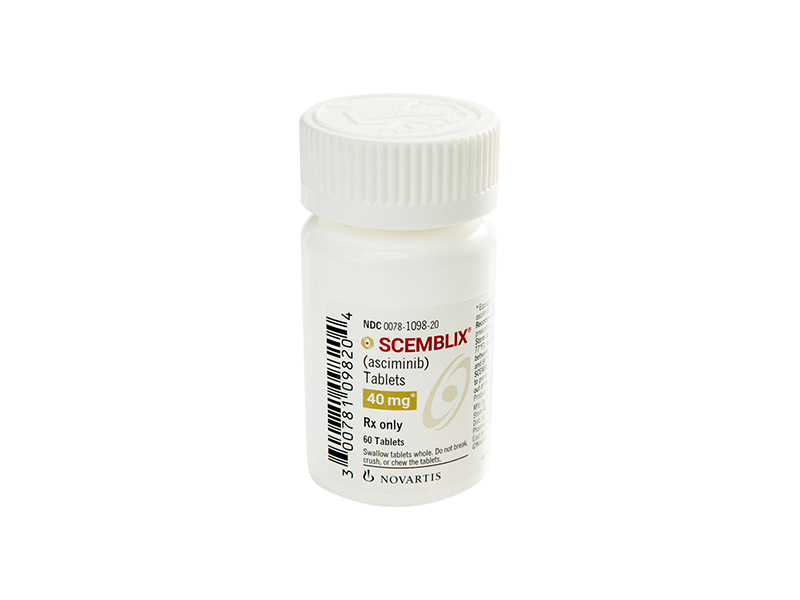Truxima (rituximab) vs Scemblix (asciminib)
Truxima (rituximab) vs Scemblix (asciminib)
Truxima (rituximab) is a monoclonal antibody that targets the CD20 protein found on the surface of B cells, and is commonly used in the treatment of certain types of non-Hodgkin lymphoma, chronic lymphocytic leukemia, and rheumatoid arthritis. Scemblix (asciminib) is a kinase inhibitor specifically designed to inhibit the ABL myristoyl pocket, used for treating chronic myeloid leukemia (CML) in patients who have received two or more prior treatments. When deciding between Truxima and Scemblix, it is crucial to consider the specific type of blood cancer being treated, as each medication is tailored for different conditions and their effectiveness is dependent on the disease's molecular targets and the patient's previous treatment history.
Difference between Truxima and Scemblix
| Metric | Truxima (rituximab) | Scemblix (asciminib) |
|---|---|---|
| Generic name | Rituximab | Asciminib |
| Indications | Non-Hodgkin's lymphoma, chronic lymphocytic leukemia, rheumatoid arthritis, granulomatosis with polyangiitis, and microscopic polyangiitis | Chronic myeloid leukemia (CML) |
| Mechanism of action | CD20-directed cytolytic antibody | BCR-ABL tyrosine kinase inhibitor |
| Brand names | Truxima, Rituxan, MabThera | Scemblix |
| Administrative route | Intravenous infusion | Oral |
| Side effects | Infusion reactions, infections, body aches, fatigue, skin rashes | Nausea, diarrhea, muscle pain, fatigue, rash |
| Contraindications | Severe infections, hepatitis B reactivation, severe heart conditions | Hypersensitivity to asciminib, uncontrolled or significant cardiovascular disease |
| Drug class | Monoclonal antibody | Tyrosine kinase inhibitor |
| Manufacturer | Celltrion Healthcare, Genentech, Biogen | Novartis Pharmaceuticals |
Efficacy
Truxima (rituximab) and Its Efficacy in Treating Leukemia
Truxima, a biosimilar to the original rituximab product, is a monoclonal antibody that targets the CD20 antigen on the surface of B-cells. It is used in the treatment of non-Hodgkin lymphoma (NHL), a type of leukemia. Rituximab has been shown to be effective in inducing remissions in patients with certain types of B-cell NHL. Clinical trials have demonstrated that the addition of rituximab to standard chemotherapy regimens improves overall survival and progression-free survival in patients with diffuse large B-cell lymphoma (DLBCL) and follicular lymphoma, two common subtypes of NHL. However, it is important to note that Truxima's efficacy may vary based on the specific characteristics of the leukemia and the patient's overall health condition.
Scemblix (asciminib) and Its Role in Leukemia Treatment
Scemblix (asciminib) is a newer medication specifically approved for the treatment of chronic myeloid leukemia (CML). It works as a tyrosine kinase inhibitor (TKI) but with a novel mechanism of action that targets the ABL myristoyl pocket, which is distinct from other TKIs. This unique approach allows Scemblix to be effective in cases where patients have developed resistance to or are intolerant of previous TKI therapies. In clinical trials, asciminib has shown promising results in controlling leukemic cell proliferation and achieving hematologic and molecular responses in patients with CML, particularly in the chronic phase of the disease.
Comparing the Efficacy of Truxima and Scemblix in Leukemia
While both Truxima and Scemblix are used in the treatment of leukemia, they are indicated for different types and phases of the disease. Truxima is primarily used for B-cell NHL, while Scemblix is tailored for CML. Direct comparison of their efficacy is not feasible due to the difference in their indications and mechanisms of action. Each medication has been shown to be effective within its respective scope of use, and the choice of treatment depends on the specific type of leukemia, patient characteristics, and the presence of any resistance to prior treatments.
Conclusion on the Use of Truxima and Scemblix in Leukemia
In conclusion, both Truxima and Scemblix have shown efficacy in the treatment of different types of leukemia. Truxima, as a rituximab biosimilar, has a well-established role in improving outcomes for patients with B-cell NHL, while Scemblix offers a new hope for patients with CML, especially those who have not responded to or cannot tolerate other TKIs. The use of these medications should be guided by clinical evidence, patient-specific factors, and ongoing monitoring of therapeutic response and side effects. As with all treatments, the efficacy of these drugs must be evaluated on a case-by-case basis in the context of an individual patient's disease and treatment history.
Regulatory Agency Approvals
Truxima
-
European Medical Agency (EMA), European Union

-
Food and Drug Administration (FDA), USA

-
Health Canada

-
Therapeutic Goods Administration (TGA), Australia

-
Medsafe (NZ)

Scemblix
-
Food and Drug Administration (FDA), USA

Access Truxima or Scemblix today
If Truxima or Scemblix are not approved or available in your country (e.g. due to supply issues), you can access them via Everyone.org.
How it works

Make an enquiry
Choose the medicine you want to buy, answer a couple of questions, and upload your prescription to speed things up. We’ll get back to you within 24 hours.


Make an enquiry
Choose the medicine you want to buy, answer a couple of questions, and upload your prescription to speed things up. We’ll get back to you within 24 hours.


Breeze through the paperwork
We'll guide you through the required documents for importing unapproved medicine, ensuring you have all the necessary information.


Get a personalized quote
We’ll prepare a quote for you, including medicine costs and any shipping, administrative, or import fees that may apply.


Receive your medicine
Accept the quote and we’ll handle the rest - sourcing and safely delivering your medicine.

Some text on this page has been automatically generated. Speak to your physician before you start a new treatment or medication.
Let's talk
If you have any questions, call us or send us a message through WhatsApp or email:
Contact us




